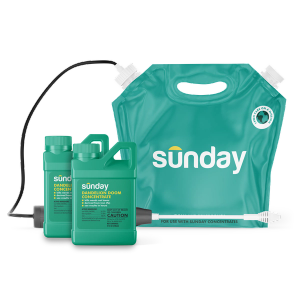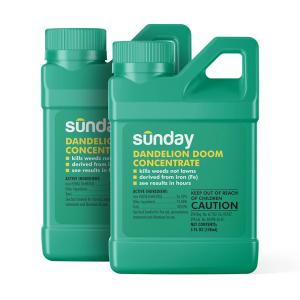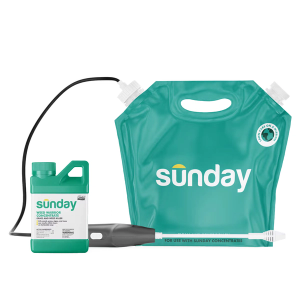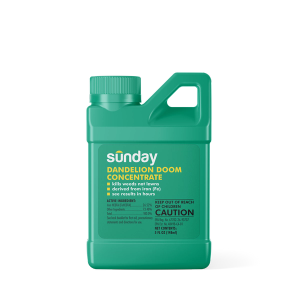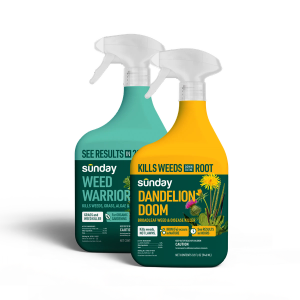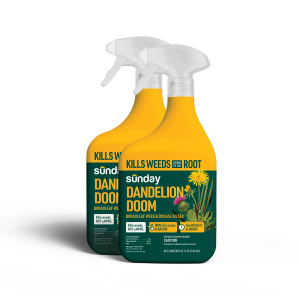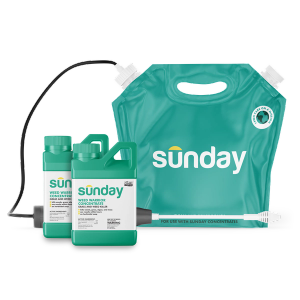Sunday’s organic garden nutrients
Our OMRI-listed garden nutrients are formulated with organic and natural ingredients to help your outdoor plants thrive, while providing organic matter to boost soil health. Check out our lineup:
- Organic All-Purpose Garden Nutrients
- Organic Flower & Rose Garden Nutrients
- Organic Veggie & Tomato Garden Nutrients
What’s in the mix?
- Dried poultry litter is an industrial by-product that provides nitrogen and phosphorus for overall growth.
- Feather meal*, blood meal, and kelp meal provide nitrogen to encourage green, leafy growth.
- Bone meal* and fish bone meal provide nitrogen and phosphorus for leafy growth, flowering, and fruiting.
- Potassium sulfate provides potassium to help plants fight off disease, manage water use, and enhance overall hardiness.
- Gypsum* provides a calcium and sulfur boost for plants.
- Sulfate of potash magnesia enhances growth and hardiness, with a dose of potassium, sulfur, and magnesium.
- Bonus: Sunday’s organic garden nutrients contain carbon-rich materials that help build soil organic matter over time.
*Not included in all organic garden nutrient products
When should I use garden nutrients?
Garden plants can be fertilized multiple times throughout the growing season! The amount will vary depending on the planting area and the type of plant you’re feeding, but it’s best to apply every 4-6 weeks—or as instructed by the label. Here's a general overview:
- Flowers and perennial plants: Spring to summer*
- Vegetables: During the growing season*
- Trees and shrubs: Spring
*As long as plants aren’t heat or drought-stressed. It's best to avoid feeding stressed plants and allow them to recover instead.
How to apply garden nutrients
Apply to containers
- Mix 2 tbsp per gallon or 1 cup per cubic ft into the potting mix or potting soil before planting or sprinkle 1 tbsp per 4 inch pot diameter onto established plant pots.
- Water in after application.
Apply to landscaping or raised beds
- Mix 2 cups per 25 sq. ft. into the top 4 inches of soil before planting.
- Apply 2 cups per 25 sq. ft. to established plantings every 4-6 weeks during the growing season.
- Water in after each application.
Apply to trees and shrubs*:
- Apply 1 cup for every foot of diameter.
- Water in after application.
* All-Purpose Organic Garden Nutrients
Apply to tomato and other high-feeders^:
- Mix 2 cups per 20 sq. ft. into the top 4 inches of soil before planting.
- Repeat every 4-6 weeks during the growing season.
- Water in after each application.
^ Veggie & Tomato Organic Garden Nutrients
Garden nutrient quick tips
- One 2-pound bag covers up to 50 square feet
- Safe to apply to edible plants when used as directed
- Pets and humans can use areas as soon as products are incorporated into the soil. Pets might be attracted to the product—so you can fence areas off to avoid sniffing or rolling.
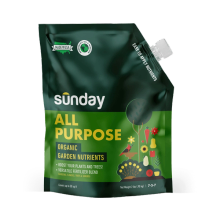
All-Purpose Organic Garden Fertilizer
- 7-3-7 NPK
- For containers, flower pots, beds, trees, and shrubs
- Feeds your plants, trees, and shrubs for 4–6 weeks
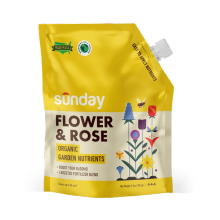
Flower & Rose Organic Garden Fertilizer
- 4-4-6 NPK
- For beds and containers
- Feeds your flowering plants for 4–6 weeks
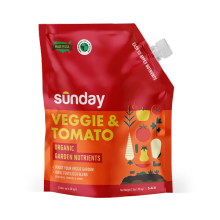
Veggie & Tomato Organic Garden Fertilizer
- 5-4-4 NPK
- For beds and containers
- Feeds your veggies for 4–6 weeks
Organic garden nutrient FAQs
How and where do I store garden nutrients?
Store this product sitting upright with the bag sealed tightly. Do not store in excessive heat or freezing temperatures. You may reuse fertilizer over multiple seasons but shake the bag to loosen granules before each use to ensure uniform application.
How do I use this with other Sunday products?
Treat weeds with Sunday weed control before applying your Sunday organic garden nutrients. Why? This prevents your feeding weeds when mixing garden nutrients into your planting area.
If you’re using any pest control products, make sure you apply those after watering in garden nutrients to avoid any disruption to pest control baits or liquid products.
What if I apply out of order?
If you applied garden nutrients before removing weeds, water in your garden nutrients, then remove and treat weeds. Just be careful not to apply weed control to garden plants or seeds!







